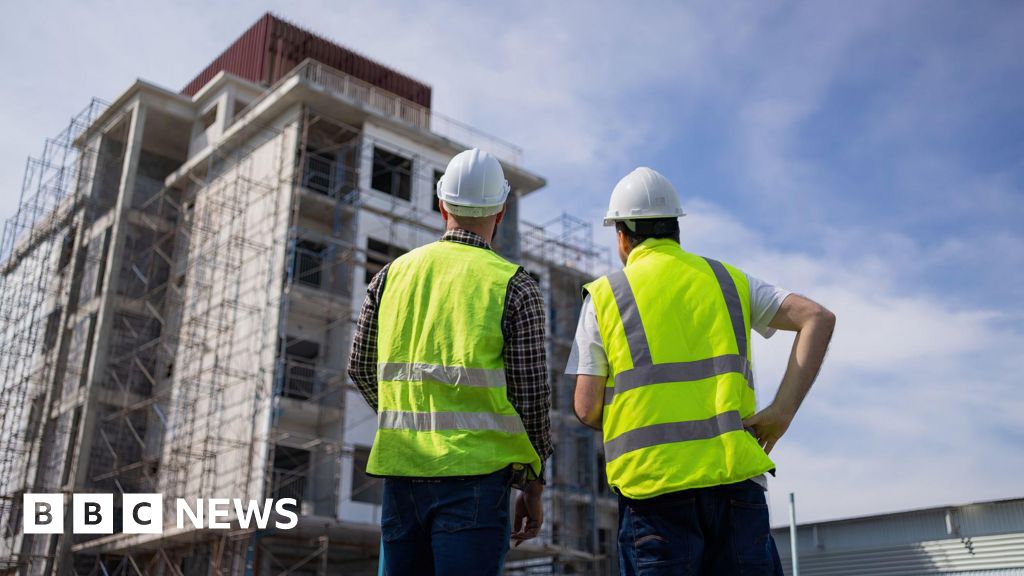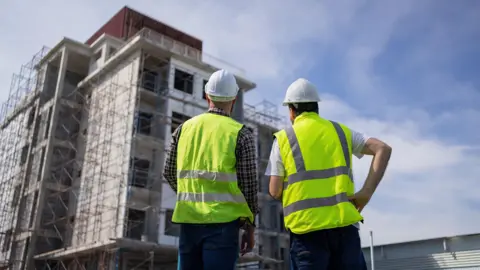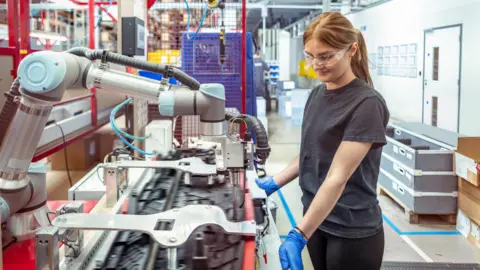NI economy: Growth of 0.4% in second quarter of 2024

 Getty Images
Getty ImagesNorthern Ireland’s economy grew by 0.4% in the second quarter of 2024, official data suggests.
The growth came from construction and the services sector, which is the largest part of the economy.
Business services continued to be the fastest growing part of the economy with output expanding by 2.9% compared to the first quarter.
Since the pandemic the business services sector has grown by 33%, much faster than the economy as a whole.
It includes things like banking, law, accountancy and management consulting.
Part of the reason for the strong performance is likely to be the work that Northern Ireland-based employees do for Great Britain and international customers.
The Canadian IT and consultancy firm CGI set up in Northern Ireland in 2021, partially as a way to expand the workforce of its wider UK business.
Chris Shorthouse, the firm’s head of client engagement for Scotland and Northern Ireland, said the development of hybrid working during the pandemic was central to that.
“Covid gave us the opportunity to really implement a hybrid working model that allowed us to employ people in Northern Ireland who could service contracts in GB,” Mr Shorthouse said.
CGI was this week awarded an £85m contract by Stormont’s Department of Justice to modernise the IT systems used by the Courts Service.
Mr Shorthouse said that while the firm is pursuing more business locally its investment does not depend on winning Northern Ireland contracts.
“In terms of our future in Northern Ireland it was never dependent on the winning of a contract. The decision to invest was really around the talent pool.”
 CGI
CGIConsumer facing services, mainly retail and hospitality, have had a more difficult time with output broadly flat throughout 2022 and 2023 as disposable incomes were hit by high inflation.
The figures suggest that there has been some recovery in the first half of this year with output up by more than 3% on the same period in 2023.
The Ringland Group, a Belfast-based hospitality group, has just opened Amelia Hall, a new bar-restaurant in the city centre.
Its managing director Peter Ringland said that the improving economic conditions had given him more confidence and that was evident in customers too.
“Interest rates being loosened off a bit is giving us confidence to invest. With customers the appetite and spend per head is slowly increasing.’
 Getty Images
Getty ImagesThe Northern Ireland manufacturing sector is continuing to face a difficult environment with output continuing to fall in the second quarter.
Earlier this week the US firm Terex, which is one of NI’s biggest manufacturing employers, announced a second round of cost cutting this year.
Stephen Kelly, chief executive of Manufacturing NI, said it was “a tricky moment” for sector primarily due to global issues.
“The world’s at war, buyers are concerned, money’s been really expensive, so putting money down on large capital cost equipment has been difficult for them.
“But these things are cyclical. These things come back around again and we would be anticipating that this would all return to normal in the next year or so.”
Related
Why investing in women is a vital next step for…
Get Nadine White's Race Report newsletter for a fresh perspective on the week's newsGet our free newsletter from The Independent's Race CorrespondentGet our fre
Business secretary signals major shift on electric car policy to…
In a determined effort to retain Nissan’s manufacturing presence in Britain, Business Secretary Jonathan Reynolds has vowed to implement “substantial c
Joint Statement: Business Secretary and Fujitsu Services Ltd
Business and Trade Secretary Jonathan Reynolds today (Friday 7 March) met chiefs for Fujitsu in Tokyo to begin talks over the cost of redress for victims of th
UK foreign secretary backs multilateral defence funding for Europe
UK foreign secretary David Lammy has said that a new multilateral fund will be needed to secure Europe’s defence as he confirmed that Britain is “open to”














